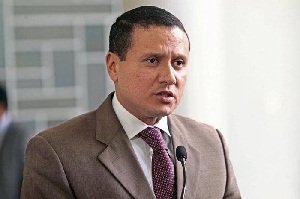 This Friday, June 3, the Ministerial Council of the organization met, and Granma spoke exclusively with the Foreign Minister of Guatemala, Carlos Raúl Morales, who referred to climate change, combating drug trafficking and the state of relations with Cuba.
This Friday, June 3, the Ministerial Council of the organization met, and Granma spoke exclusively with the Foreign Minister of Guatemala, Carlos Raúl Morales, who referred to climate change, combating drug trafficking and the state of relations with Cuba.
According to Morales, this 7th ACS Summit seeks to further strengthen the ties between the countries bathed by the Caribbean Sea, which have historically been separated by communications and transport problems, one of the causes of little contact and inter-Caribbean trade.
However, the Foreign Minister noted that the ACS was established in 1994 and emerged with the purpose of creating direct links and common interests among its member countries, with transport as one of the main areas of action.
The Association has seen times of crisis but in recent years has found the direction needed to strengthen our ties and ensure the understanding that our countries share a magnificent wealth: the Caribbean Sea, he noted.
FACING THE CHALLENGES
From the Inaugural ACS Summit held in Trinidad and Tobago in August 1995, its areas of focus were identified, currently trade, transport, sustainable tourism and natural disasters.
Among them is also climate change, which according to the Guatemalan Foreign Minister is of great concern, given that Central American countries and the Caribbean islands are highly vulnerable to this phenomenon.
We are affected by earthquakes, tropical storms and drought, which make joint efforts necessary, and therefore we have made efforts to coordinate a single policy to combat climate change, he said.
According to Morales, in Guatemala there is a risk that thousands of families are left without food due to an excess, or a total lack, of water. He noted that one thing is clear – climate change, together with drug trafficking, is one of the greatest threats to the entire Latin American region.
Referring to the fight against drug trafficking, the official explained that this is a complex issue for Central American countries, as drugs are produced in the south and consumed in the north.
Guatemala is a country that serves as a transit route for drugs, and where the vast majority of the population does not consume them, but has experienced their terrible effects.
The authorities of my country have worked very hard on the issue of security and it has paid off: in 2008 we had a rate of some 48 violent deaths per 100,000 inhabitants, and today that figure has been reduced to 29.
Morales noted that most of these deaths are caused by the phenomenon of drug trafficking, and the decline is due to more effective policing, an institutional framework on public security, and an increased awareness of the population.
Coordination with countries in the region is critical because we are small states and there are large cartels operating in our region, many of them from Mexico and Colombia.
In this sense, we depend on the High-Level Group on Security and Justice (GANSEJ), created last year and composed of the secretaries of Defense and Security and the Public Ministry of Guatemala and Honduras.
In addition to these institutions, are the operations of the Maya-Chortí Bi-national Task Force, with the aim of developing joint action on issues such as security and immigration control.
GANSEJ has already been very effective in reducing the violent effects of drugs, the Foreign Minister noted.
GUATEMALA IS COMMITTED TO INTEGRATION
My country has a commitment to integration, the Guatemalan official said, adding that the country is a member of the Community of Latin American and Caribbean States (CELAC), the ACS, the Mesoamerica Integration and Development Project and the Central American Integration System (SICA), among others, all of which have their own objectives.
In particular, the regional mechanism of SICA goes beyond measures of consultation, coordination and cooperation, and seeks political integration, he noted.
One of the most important events for Latin America and the Caribbean was the declaration of the territory as a Zone of Peace, signed in Havana during the Second CELAC Summit of 2014, he stated.
In this regard, Morales stressed that in our region there are no atomic bombs or serious conflicts, as is the case elsewhere in the world, and that this should be appreciated in proper perspective.
Referring to the relations between Cuba and Guatemala, Morales described these as excellent, and noted that they are the best reflection of bilateral cooperation.
My country has the privilege of the presence of a Cuban medical brigade to reach the most remote communities, and thanks to the Miracle Mission, vision has been restored to more than 180,000 low-income Guatemalans.
Likewise, more than 800 young Guatemalans have graduated from the Latin American School of Medicine (ELAM) in Cuba.
This is the best example of South-South cooperation, and we hope that the friendship between Cuba and Guatemala is increasingly strengthened, the Foreign Minister concluded.
(Prensa Latina)